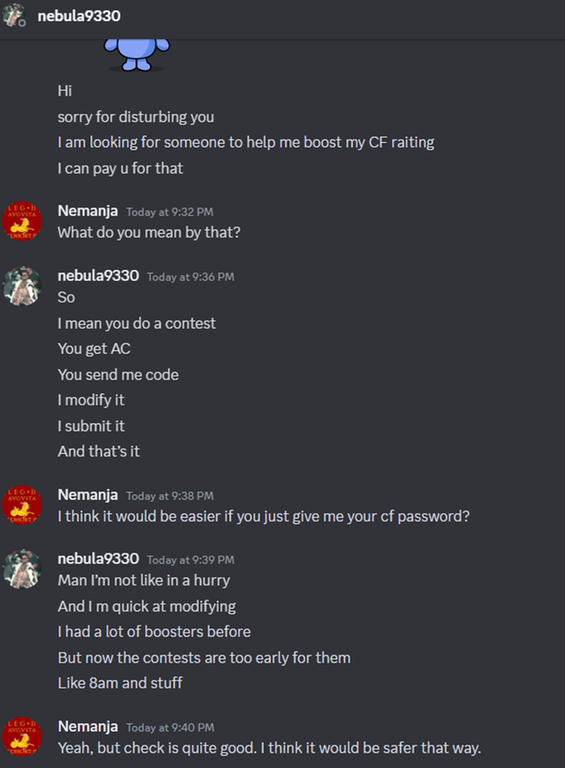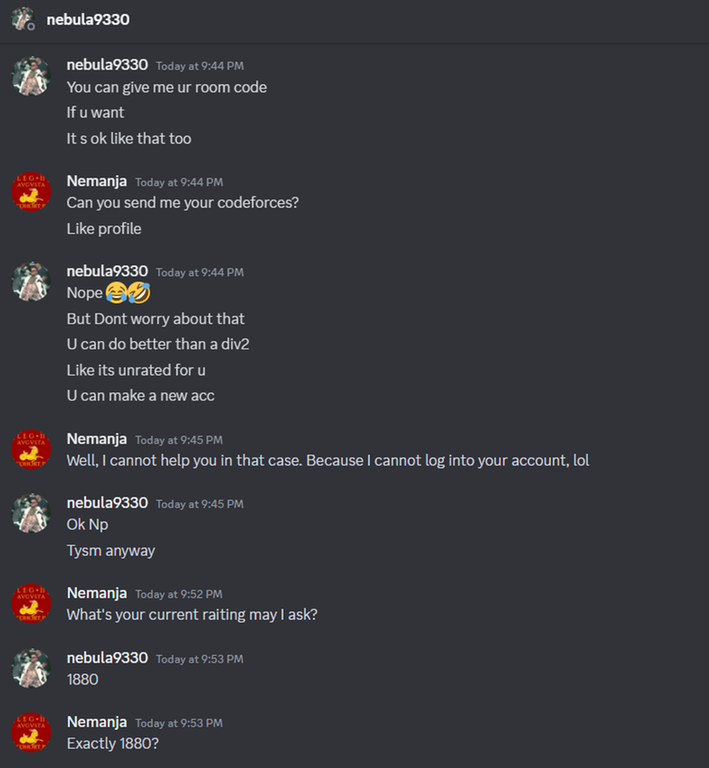Hello codeforces,
Today is the first time someone has come to my DMs asking to help them cheat. I am happy they see me as a good programmer, but sad that they want to cheat. To teach them a lesson and discourage others from cheating, I decided to make this blog exposing them. (And you also get to see me trolling them)
At first, I wanted them to give me their CF password so that I could submit WA and then make a ton of wrong hacks, making their rating go down a lot. Maybe even make a blog on their account exposing them. Sadly, that didn't go well, so I just did some trolling. Also, I would like to warn you that some people might screenshot the DMs in an attempt to frame you. So message someone about you trolling a cheater before you do it. (I sent a message to my friend straight away)
I did not manage to get who they are, but you can see their discord. Their discord ID is 913137636120596530.
Lastly, I will give my own opinion on cheating. Firstly, I think it is pointless. Like, you will get the rating, but that is not your real rating. You will know that, and will not feel any satisfaction from someone else reaching a good rank in codeforces, as you will always know you are not that good. And other people do not care about your rating. Like, if you do programming with someone, your true rating will come to light.
And for those who are angry that cheaters are making your ratings worse, I do understand you. However, remember that your performance depends on you only. The performance of others does not matter, as you want to improve yourself. (But yes, I do get wanting to get higher rating, or to beat a friend, makes it more interesting)















"to beat a friend, makes it more interesting" — This is the most satisfying thing ^_____^
most intelligent grey
It seems people will make accusations. I purposely avoided making any as I don't have evidence. I encourage others to not make potentially slanderous accusations without proper evidence.
if he is not lying about he's rating, then most probably he's account is funnylmao123, because there are only 13 1880 rated accounts on codeforces and it's the most suspicious one. I checked the contests of this account and most of A's was solved too late and it's the sign of that the person sends him ac code and he "modifys" it and it takes time, only a few time A was solved fast and these problems were too easy it means maybe he solved it in his own.
It seems people will make accusations. I purposely avoided making any as I don't have evidence. I encourage others to not make potentially slanderous accusations without proper evidence.
when I was writing this comment I was also like I have no proofs, but commented because it's so suspicious that expert can't ac div3A in 10 minutes. Anyways, you are right.
For real. Look at this. Dude solved Div2-D in 2 minutes, took less time than Div2-A.
However, remember that your performance depends on you only. The performance of others does not matter, as you want to improve yourself. That is so true, yes, but that thing probably bothers me the most. The issue is that with heavy cheating it will be almost impossible to keep the track of whether you've improved or not. How many people do you think cheat per contest? Well, official information states that it's something about 100. However we have aslo confirmed information that there are cheating groups with thousands of participants. Do you really think that only a hundred out of these people would cheat? We've come to the point that possibly there might be thousands of cheaters participating in contets as well. With such heavy cheating the inflation of both problem ratings and your average perfomance is just inevitable. So at some point you will find yourself to be able to solve only 1500 rated problems while in the past you could easily solve 1700 rated. And it's not because you've become dumber, it's because your efoorts are nothing compared to the effort of thousands. Personally, I've noticed a lot of people across the cf who've unjustly escaped plagiasm check and these guys were able to cheat up to 2200 rated problems. I really don't care about the rating, but that's my main issue with cheaters.
i am telling the reason why they cheat..they have no self respect.. they think through cheating they can shortlisted through cf rating..but that's absoulutely wrong they might be. but thats harmful for them because through the level of cf rating level interviewer will be asked que lmao.. tit for that situation will be happen !! are u agree with me
same here official_aditya_07
However, remember that your performance depends on you only. The performance of others does not matter, as you want to improve yourself.
That is so true, yes, but that thing probably bothers me the most. The issue is that with heavy cheating it will be almost impossible to keep the track of whether you've improved or not. How many people do you think cheat per contest? Well, official information states that it's something about 100. However we have aslo confirmed information that there are cheating groups with thousands of participants. Do you really think that only a hundred out of these people would cheat? We've come to the point that possibly there might be thousands of cheaters participating in contets as well. With such heavy cheating the inflation of both problem ratings and your average perfomance is just inevitable. So at some point you will find yourself to be able to solve only 1500 rated problems while in the past you could easily solve 1700 rated. And it's not because you've become dumber, it's because your efoorts are nothing compared to the effort of thousands. Personally, I've noticed a lot of people across the cf who've unjustly escaped plagiasm check and these guys were able to cheat up to 2200 rated problems. I really don't care about the rating, but that's my main issue with cheaters.
I used to find my performance fluctuating a lot back when I was Mid-Expert; I guess there's some sort of a cheater distribution, with most lying below CM. At least — after around 1800-ish I haven't felt that slight difference in performance is throwing me off the ranks too much (because of — say, some imaginary cheater wall, where most cheaters lie, skewing ranks).
It was basically a a motivator for me — to jump beyond that, get to stable CM. 😐 Have been lacking the same motivation for Master somehow.
Bro's dangerous!!! :)
btw,if someone climbed rating by paying =>they gave less no of contests,and its easy to see from graphs of people if they feel genuine or not ig
Dude actually requested MOD as a price xd, great blog btw
In the last contest EDU 166, it's pretty evident that tons of people have cheated in C, anyone can easily identify that by just looking at the code, these people have destroyed every platform wherever they go, whether it be Codechef or LeetCode. Codeforces need to develop some kind off mechanism to check otherwise it's going the same way as of LC & CC.
Cheating exists not because the cheaters are too smart but because admins of codeforces are not active enough. If you go to telegram, and search "codeforces solutions" or "cp solutions", there you will find multiple such groups with thousands of members. Since, codeforces itself is sponsored by telegram, why can't they ask telegram to keep actively deleting those groups ?
Cheating exists not because the cheaters are too smart but because admins of codeforces are not active enough. If you go to telegram, and search "codeforces solutions" or "cp solutions", there you will find multiple such groups with thousands of members. Since, codeforces itself is sponsored by telegram, why can't they ask telegram to keep actively deleting those groups ?
most intelligent grey
Deleting each and every telegram group doesn't sound like a good solution, cheaters will actively create new groups and/or use other sites to communicate, or just conceal the fact that a group is used for cheating.
Goodness man, it makes me sad to see that even experts are cheating (although it could entirely be possible that he got to expert because of cheating anyway)
Bro I have one genuine question for you.
Why did you not take his offer? Is it you becoz you worked hard to become a master and didn't want to spoil the game or for newbies like us? Even if you were gonna help him there is no way for him to ever be higher rated than u until unless he hires someone better.
For community — If people can reach candidate master and master with cheating than what's the point of anything. It's not like there were not enough talented people on codeforces to make normies like me despair but people can probably reach GM and talent/hard work etc won't even matter.
But in the end just we play the game coz we are addicted to it, there's nothing I can do now but be tormented.
Sure, it is probably demotivating to know that cheaters are reaching high ranks without putting in the hard work themselves. But reaching CM/M is not going to benefit these people at all.
Reaching a rank feels amazing when you do it through your own efforts, but doing it through cheating is basically pointless. Nobody hires based on CF rating, and people respect others not necessarily for their rank, but more for what they contribute to the community for others or for their results in official competitions where it's pretty much impossible to cheat.
While I agree that cheating negatively impacts people who 'play' by the rules, and sometimes (or perhaps more than sometimes) they may not be caught and take prize money, why not twist it into a source of motivation for you? It will feel even better when you overtake them because they didn't work hard and you did.
it'll, it's a bonus point in interviews for small companies
Firstly, that wouldn't be helping anyone.
I shouldn't even need to add to that, but I will. I am simply against it, as I said in my blog, you are only fooling yourself. And obviously, I do not want to be associated with such a thing. I am a CP enjoyer, CF Master, IOI medalist, problem setter myself, and probably a member of the Serbian committee from next year. I am not going to give all of that up over some small amount of money.
Even when I help people with upsolving problems, I also do not like to give solutions. I prefer to give just hints, as most fun comes from figuring out the problem and enjoying the process of going from reading to AC. Without it, AC doesn't feel special.
Bruv, the "just give me your codeforces password" part was smart, it would've been over for them.
wtf is this comment spam??
I think people cheat so that they can show it in their resume that they have such and such rating and title on codeforces. But even that is not very effective as truth will be out when the company interviews you on your coding skills.
It's crazy how he might not be the only one doing this bs. They are taking so much away from people who give an honest contest and do it to the best of their abilities. I hope Karma get's their asses.
bro thats easy money why did you reject it
It could be that the cheater is actually out to "expose" high-rated users who sell out easily. OP made the right call here.
maybe you should have talked to him a bit more to find out who has the cheater face
Good job! Trolling cheaters is funny :)
I really miss your blogs :' )
When next Wind_Eagle round?
could have been this guy: https://codeforces.me/profile/piotr.kukla but he not solved a problem for a year.
bro what
that guy hasn't been online in 7 years
I wrote that 4 weeks ago
bruh I meant the user that u linked